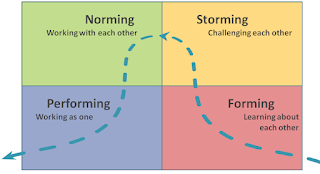1. During the Forming stage, some members are anxious, as they haven’t yet worked out exactly what their role on the team will be. Others are enthusiastic about the task ahead. As a leader, you play a dominant role at this stage. This stage is usually fairly short, and there should be discussions about how the team will work, members’ roles and responsibilities, and the goals and objectives of the team. This is the ideal place to establish team norms or behaviors – identify behaviors that will cause your team to succeed and behaviors that will cause your team to fail. Suggested team-building activity: Gutter Clutter
2. In the Storming phase. Your authority may be challenged as others compete for position as their roles are clarified. As the leader you must be aware that some members may feel overwhelmed by how much there is to do, or they may be concerned with the processes and procedures being used. This is the stage when many teams fail, and even those who stick with it feel that they are on an emotional roller coaster as they try to focus on the goals of the team. Members may react by questioning how worthwhile the goal of the team is or resist taking on tasks. Suggested team-building activity: Confrontation is Not a 4-Letter Word
3. During the Norming stage, as a hierarchy is established. Team members come to respect your authority as leader, and others show leadership in specific areas. The team members may be socializing together, and they are able to ask each other for help and provide constructive criticism. The team is developing a strong commitment to the team goal, and you start to see good progress towards it. There is however, often a prolonged overlap between storming and norming behavior. As new tasks come up, the team may spiral back into typical storming stage behavior. Suggested team-building activity: Relay
4. In the Performing stage, the work of the team leads directly to fulfilling goals and a shared vision. The group is asking "How can we do our best?" and is focused on creative problem solving Being part of the team at this stage feels “easy” compared with earlier on. Characteristics include harmony, productivity, effective problem-solving and full development of the potential of the group and the individuals in the group. As the leader, you are able to delegate much of the work and can concentrate on developing team members. Suggested team-building activity: Reach for the Sky










No comments:
Post a Comment